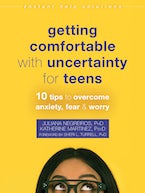By Juliana Negreiros, PhD, and Katherine Martinez, PsyD, coauthors of Getting Comfortable with Uncertainty for Teens
If you’re looking for a comedy this summer, check out Red Notice with Ryan Reynolds and Dwayne Johnson. The duo partners up to steal an ancient artifact, and hilarity ensues due to their struggle with teamwork. In one scene, Ryan Reynolds repeats the word “team” over and over, claiming how strange it feels on his tongue! But the message throughout is clear: We do better when we work as a team. When facing uncertainty, which this movie also has in spades, the same is true for adolescents. Our teens do best when we join them on their journey as partners or assistants rather than the directors we may have been in their younger years.
Uncertainty is the fear of adverse outcomes arising from the potential unknowns. Given there is so much change throughout the life of an average teen, it makes sense that some of them come to fear so many negative unknowns that they develop intolerance of uncertainty. Teens may exhibit challenges with uncertainty by seeking excessive reassurance from you or their friends about what others think of them. They may also refuse to try new things due to a fear of mistakes or failure they perceive to be inherent when uncertainty reigns. However, coping with uncertainty through reassurance seeking or avoidance, among other ineffective methods, is less than ideal. Fortunately, teamwork creates the dreamwork, and whether you are a parent, loved one of a young person, a clinician, teacher, or coach who works with youth, offering to walk alongside them as they learn to face uncertainty can make all the difference. The following ideas will help you form an effective partnership as you and your teen learn how to navigate the world of uncertainty.
Prioritize Listening, Not Problem-Solving
Parents and adults who work with youth are expert problem-solvers due to the nature of the job! So, slowing down to listen doesn’t come easy for many of us. However, to encourage teens to face uncertainty, you must give them time to express what’s bothering them, which means prioritizing listening. This can be accomplished by creating a space where teens can talk, and we don’t, period. Brief car trips are a great place to ask your teen to open up, as are small tasks with which you need their assistance, such as packing up materials after a class or activity or preparing a snack together. These moments provide quiet space for them to reflect, organize, and express their thoughts, with you serving as a silent presence simply to listen. They may expect you to jump in and start solving, so let them know you’re trying something new. Explain how you simply want to hear from them about their problem and better understand their struggle with worry and uncertainty. But be warned: patience is hard for us savvy problem-solvers. We often have life experiences that truly might help them. However, teens do best when they’re actively part of their own solution and aren’t simply receiving our advice or doing what we suggest. So, step back, be quiet, and prioritize listening.
Validate and Reflect
Once your teen starts talking, your job is to hear what they say. Keep judgment out of it. You do not need to state an opinion or offer a side to weigh in. Instead, reflect on what you have heard: it sounds like you have been dealing with a lot, and it’s weighing on you. Keep it brief. That must be hard. And insert your guess at a feeling if applicable. I wonder if you’re feeling trapped. Then let them guide you further into their world as they become more comfortable opening up. As you hear more about their situation and fears, you can reflect on what you understand to be the problem (not the solution). The truth is a well-defined problem is a problem half solved. And feeling heard and understood can also help a teen feel supported and less alone, which can make a huge difference in their lives. But don’t be surprised if it takes some time for them to open up. If you’ve been problem-solving for a while, they might assume that’s where this mini conversation is headed and reject your offer to talk. But like fishing, keep casting that line out to them. Eventually, they’ll accept your offer.
Be an Influencer
If you have effectively validated your teen’s experience, you will have listened to their concerns, and together you understand the problem. With this newfound partnership, your teen no longer has to face their difficulties alone, and with you walking alongside them, the weight of the problem is naturally dispersed. This can allow you to influence how they deal with their challenge. For example, do they approach it with a doom-and-gloom attitude, or can you help them see it as a routine life problem they can face? You can boost your teen’s confidence by reminding them of past difficulties they have successfully tolerated and overcome. Or you can briefly share about your own past struggle with a comparable situation. The truth is that most of what we fear never comes to pass. Reminding your teen of this fact can help them gather the strength to push back against their worry and take small, calculated risks to solve their problem.
Help Your Teen Test it Out
One of the best ways to cope with uncertainty is to design an uncertainty-provoking experiment and test it out. For example, suppose your teen is afraid of going to a social event where they don’t know many people, and they predict no one will talk to them. While we cannot promise that people will chat with them, we do know that most of the time, the worst-case scenario doesn’t happen. Thus, help your teen break down the situation into smaller, well-defined, achievable parts and tackle it one at a time. For example, rather than encouraging them to go to and stay at the party until the end, suggest driving them there with a plan for them to go in for fifteen minutes while you wait outside. If it’s as they predict, after fifteen minutes, they can leave. However, if it’s better than expected, agree to collect them later. Breaking down daunting situations into smaller parts, with you helping plan out to test out the experiment, can encourage your teen to take small risks in facing the mystery of uncertainty. Even if the best outcome doesn’t come to pass, tell them that testing it out is still a win as they had the confidence to take a small risk rather than avoid it altogether, and they got through it!
Living a full and meaningful life means facing uncertainty. However, our teens do not need to travel this journey alone, and until they begin their adult life, we have a few years to help support them as they navigate routine unknowns. Consider it an opportunity to shift from being a director to being an associate. In doing so, help your youth learn to make decisions for themselves and take small and valuable risks toward the life they want.
Juliana Negreiros, PhD, is a registered psychologist and researcher who is passionate about working with young people with anxiety, obsessive-compulsive disorder (OCD), and behavioral difficulties using cognitive behavioral therapy (CBT) and acceptance and commitment therapy (ACT).
Katherine Martinez, PsyD, is a registered psychologist with more than twenty years of experience in clinical work, training, and research. Martinez uses CBT, ACT, and dialectical behavior therapy (DBT) to treat anxiety, mood, and childhood disorders in young people.



 2024 Peace Playbook: 3 Tactics to Avoid Clashes with Your Partner
2024 Peace Playbook: 3 Tactics to Avoid Clashes with Your Partner